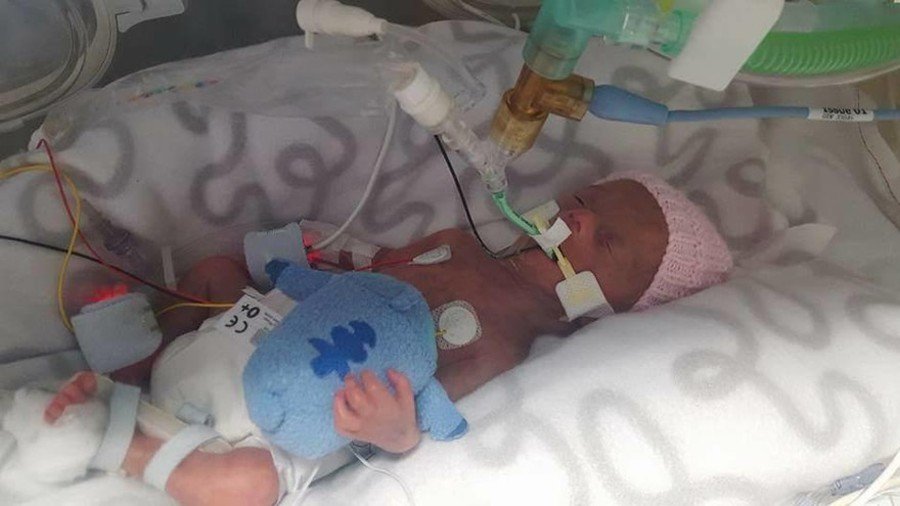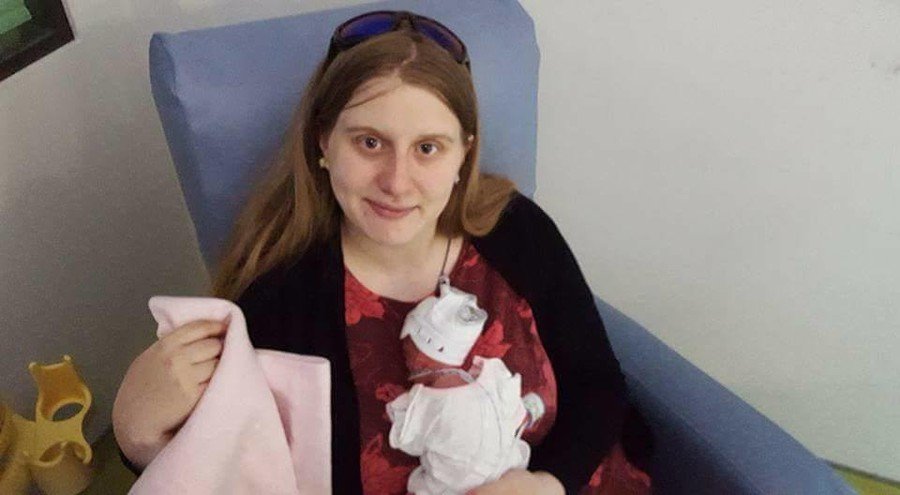‘Lucky she wasn’t stillborn’: Mom hopes health system shake-up will end horror birth complications

Nova is lucky to be alive. Born two months early, she survived the complications that forced her early arrival. Her mother hopes that other families will no longer have to suffer the same horrors that affect too many births in Britain.
Mom Rebecca Bradley nearly lost her first and only child to a lack of oxygen, a complication stemming from her pre-eclampsia – a condition marked by high blood pressure. According to a 2016 infant mortality report, 25 percent of stillbirths in England and Wales are the result of a “lack of oxygen or trauma just before or during birth.”
The mom from England’s West Midlands has repeatedly asked for an investigation into the circumstances that led up to the near-loss of her baby, but has been denied at every turn. She said that a new maternity strategy announced today by the UK government, which aims to reduce the number of stillbirths and other avoidable birth complications, has given her renewed hope for change.
Bradley was 29 weeks pregnant when she noticed her baby had stopped moving. She was admitted to hospital for scans, and was rushed to theater shortly thereafter for an emergency C-section.
“My blood pressure was sky high, I don’t remember the exact numbers, but it was high enough for them to be concerned. A scan was carried out which showed that my placenta was failing. Nova was being suffocated,” Bradley said. “This is why she wasn’t moving… they needed to get her out, and quick.

“Nova’s cord actually snapped not long after she was taken out, it goes to show just how bad it was. She came out with her toes and fingers blue because of the lack of oxygen. Thankfully, after a few seconds I heard the quietest, tiniest little cry. She was wheeled over to me for the briefest of briefest glimpses of my daughter,” the 28-year-old added. “People often ask parents what the first thing you say after giving birth. For me, it was ‘Please look after her.’”
Bradley says that they were “very lucky Nova wasn’t stillborn – she nearly was,” and believes that doctors should have picked up on the warning signs earlier.
“I think they definitely picked up early signs of it,” Bradley told RT. “I was presenting with a slightly raised blood pressure from quite an early [point during] gestation. Closer monitoring could have prevented Nova’s early birth.”
Nova, who is now aged two, has been in and out of hospital since her birth in 2015. She’s been diagnosed with a number of health conditions as a result of her premature birth. The plucky toddler suffers from hypermobility, low muscle tone, right-sided weakness and is fed by a tube. She also has a rare form of epilepsy called West Syndrome, which may have been caused by her brain bleed at birth or her deprival of oxygen in the womb.
@Jeremy_Hunt has set out plans today for a Maternity Safety Strategy, following @mbrrace report that found 8 out of 10 cases where babies were stillborn or who died shortly after death could have been saved by improvements in care. Read our response at https://t.co/ZMckOkbNitpic.twitter.com/jCzWG5bNQM
— Bliss Baby Charity (@Blisscharity) November 28, 2017
West Syndrome left Nova completely deaf and blind. Now she had been formally diagnosed and treated, doctors say she has regained her senses, but it is hard to tell as the tot is yet to start talking,
While things are looking up for Nova, her mother hopes that a new healthcare strategy announced today by the UK government will one day mean premature births like Nova’s will be avoided.
Under the plans, hundreds of stillbirth, early neonatal death and severe brain injury cases each year will be referred to the independent Healthcare Safety Investigation Branch (HSIB), the new NHS safety investigator led by experts, so that the NHS learns as quickly as possible from what went wrong and shares the learning to prevent future tragedies. Full-term stillbirths will now be investigated by coroners.
Secretary of State for Health Jeremy Hunt said previous investigations into stillborn deaths may have added to the grief felt by parents, and this new strategy aims to prevent that. “The tragic death or life-changing injury of a baby is something no parent should have to bear, but one thing that can help in these agonizing circumstances is getting honest answers quickly from an independent investigator,” Hunt said. “Too many families have been denied this in the past, adding unnecessarily to the pain of their loss.
“Countless mothers and fathers who have suffered like this say that the most important outcome for them is making sure lessons are learnt so that no-one else has to endure the same heartbreak,” he added. “These important changes will help us to make that promise in the future.”
The British government also announced that it will bring forward its target to slash the rate of stillbirths and birth complications by 50 percent by five years. By 2025, the health system hopes to halve rates of stillbirths, neonatal and maternal deaths, and brain injuries occurring during or soon after birth; saving more than 4,000 lives and preventing post-natal complications for babies like Nova.












